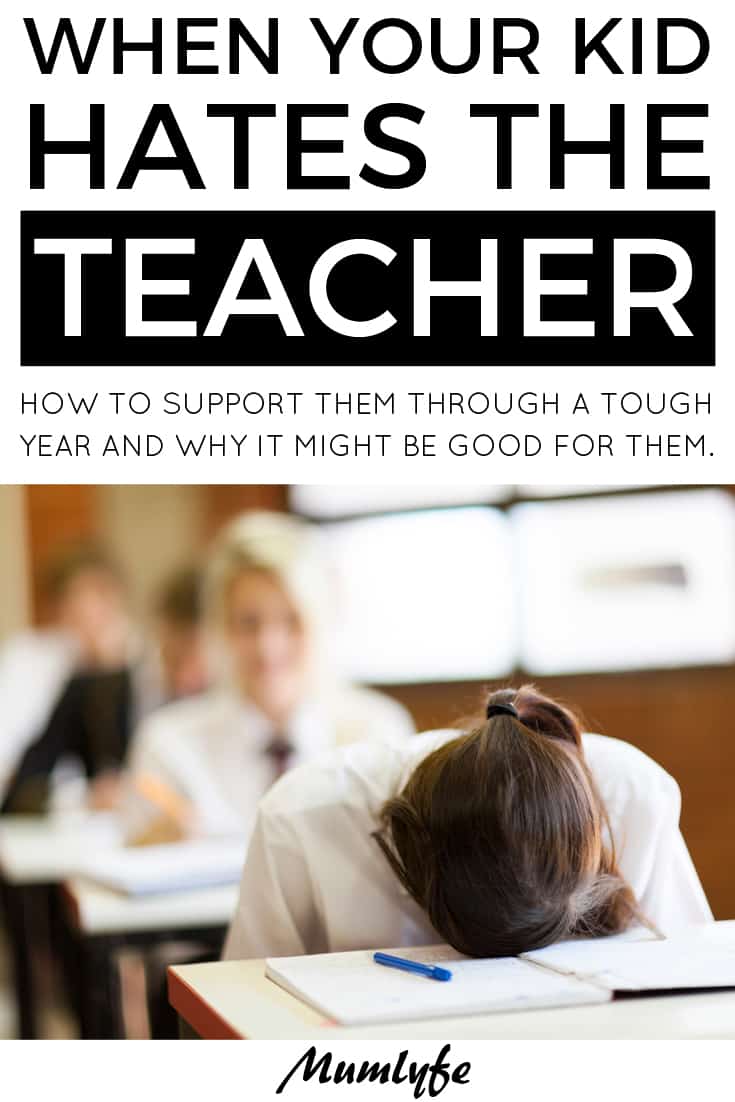One of the hardest things when you have kids in school is when your kid just doesn’t like the teacher. It’s a daunting prospect, especially at the start of a school year. Your child can feel overwhelmed, sad, frustrated and downright scared. I’m a mum of two school kids, so I can totally relate.
I’m also an ex-teacher, so I want to help you make the best of the situation. It’s certainly harder when a primary student doesn’t like the teacher, when they only have one, but they can still have a good year.
This might help too: The anxious mum’s guide to back to school
Why kids don’t like their teacher
A kid can feel like they don’t like the teacher for a number of reasons:
• Preconceived ideas of the teacher. This can sometimes can last the whole school year, no matter what a teacher does. Rumours about what teachers are ‘like’ are often passed on by other kids who didn’t like the teacher either.
• Not their preference. The child really wanted another teacher who they didn’t end up with. This was my son at the start of this year, but now he’s super happy with the teacher he has.
• Poor first impression. Maybe the teacher came in shouting on the first day. Maybe they were having a bad day and were less tolerant of classroom behaviour. There are plenty of reasons why a teacher might not appear great to start with.
• Something specific. Your child might have started out liking their teacher, but no longer does. Perhaps they feel unfairly treated by the teacher. Or feel the teacher has favourites. Or they simply don’t like the teaching style.
Making the best of the situation.
Unless the teacher is in breach of ethics, rules or, let’s hope not, laws, your child does need to try and make the best of the situation. We can’t let one teacher negatively impact on a child’s education and view of the school and their learning. There are other good reasons to learn to tolerate the situation:
• It’s good for them to realise that not everyone in the world gets along, and the same can be said for teacher-student relationships.
• It’s helpful for kids to learn to endure things they might not necessarily like.
• It’s good for kids to learn how to get along with people they might not necessarily like.
• A year of school, though it seems long at the start of the year is really only 40 weeks, 200 days. It’s really a small blip on a kid’s school radar.
Read this too: What makes kids happy at school
A teacher’s perspective
I’ve had kids say to me “Don’t you like me, Miss?”, but I’m not lying when I say I’ve liked every student I’ve taught. Even the most difficult kids have redeeming features. I have never really come across a child that I couldn’t like for some reason. So it’s doubtful that your child’s teacher ‘doesn’t like’ your kid back.
Regardless, a teacher has a job to do and that is to teach every student within my classroom to the best of my ability. That means putting personal differences aside, so liking or not liking isn’t really an issue.
I’m not lying when I say I’ve liked every student I’ve taught. Even the most difficult kids have redeeming features.
When I taught in London many years ago, there was a child in my class who repeatedly told me “My mum doesn’t like you, she thinks you are a bad teacher”. But I harboured no bad feelings for that kid, instead, I went about my daily teaching and just ignored the comments. It wasn’t worth worrying about for me.
10 ways to support you child
Here are some practical things you can do to help when your child doesn’t like the teacher:
• Find out why they don’t like the teacher. Ask them to explain their reasoning. Often when they realise they can’t explain it, it becomes less of an issue. If they have good reasons for their dislike, work out whether you feel their concerns need to be escalated.
• Explain to them that you won’t like everyone you come across in life. Sometimes you will have to learn from/ work with/ be around people you don’t like. You need to make the best of the situation. This might involve taking a ‘head down, bum up’ approach for the year. They don’t have to engage with the class, but they do have to quietly do their best.
• Help them see the teacher’s perspective. It’s hard for kids to put themselves in others’ shoes. Talk to them about why they think the teacher is the way they are. Explain that ‘being too strict’ isn’t outside of a teacher’s job description. Talk about different learning and teaching styles.
• Rise above it. A great strategy for life is to ‘kill ’em with kindness’. Challenge your child to be the most helpful, best behaved, hard-working student the teacher has ever had. It will be a ‘win’ for the teacher, but it will be even more of a win for your student.
• Unpack the feelings. Ask your kid to note down concrete examples of behaviour they don’t like. Together, you might be able to find perspective. Or you will have some examples if there is a reason to escalate your child’s concerns.
A great strategy for life is to ‘kill ’em with kindness’. Challenge your child to be the most helpful, best behaved, hard-working student the teacher has ever had.
• Have a meeting with the teacher. This is especially important if there are genuine reasons for your child’s concerns. The first port of call is to talk to the teacher about things. If your child is willing, maybe they can find some common ground that will help to move the relationship forward.
• Look out for key issues. If it’s a one-off event that has caused the situation, then often unpacking it together with all parties involved will help. If the issues are on-going, talk to the teacher and escalate if necessary.
• Keep checking in. The ‘I hate my teacher’ blues will flare up from time to time. When your child is in the middle of a hate session, it’s very difficult to talk to them objectively. Instead, catch them when things have calmed down a little. They are more likely to find some good things to say, reinforcing that every teacher isn’t all doom and gloom.
• Make sure they have plenty of homework help. Help your child meet teacher expectations by giving them as much support as necessary at home.
• Give them something to look forward to. School terms feel long ( and sometimes are – 11 weeks in term one this year in NSW). Often what seems terrible now will be a lot better after a break. Remember that everyone feels better after a holiday.
It’s probably not going to be your kid’s favourite school year, but it just might be their most beneficial. Learning to endure, getting along with difficult people, enhanced grit, increased resilience and better tolerance are just some of the take-aways from a tough school year.
Has your child ever not liked a teacher?




